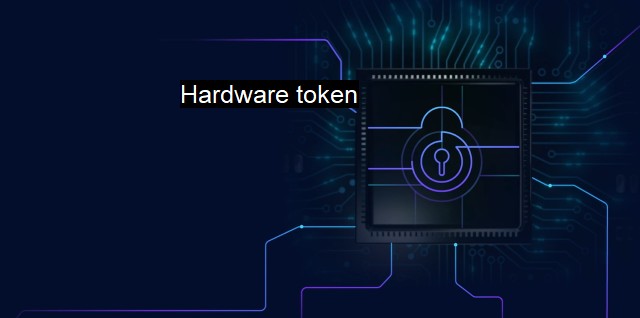What is Hardware token?
The Role of Hardware Tokens in Enhancing Cybersecurity and Antivirus Protection: Improved Access Controls and Secure Transactions
Hardware token, often referred to as a secure or hardware authentication token, is a physical device utilized for authorizing access to soensitive data, systems, network services, or applications. it serves as an integral element for providing two-factor or multi-factor authentication to enhance the level of security.A hardware token, mainly is a small keychain-like device, functioning as the electronic key counterpart. It can generate a unique one-time password (OTP) that users need to input along with their regular login credentials, providing an additional layer of protection against any unauthorized access.
We live in an era where cyber threats have been rapidly evolving, and a simple username and password combination no longer offers adequate security. Recent years have seen enormous shifts in technology, including an increasing trend towards teleworking, cloud computing and artificial intelligence. This exponential increase in technological expansion has, unfortunately, also demonstrated a parallel swell in cyber threats.
Riding this digital wave, hardware tokens have secured their spot as one of the quintessential cybersecurity tools. The fundamental principle of its usage lies in something you know (like a password) and something you have (the token). In this way, even if a hacker manages to steal your password, he or she cannot gain access to the system without the physical token as well.
Getting under the skin of a hardware token, it is armed with an embedded security chip powered by a clock that generates time-sensitive, dynamic numbers (OTP), which changes after a short interval. The absolute need to have both correct password and the current unique OTP from the physical hardware token makes cracking the security system a Herculean task, providing an upper hand in security measures.
Often, hardware tokens come in tamper-proof designs which adds another layer of security from physical hacking attempts. Also, unlike mobile or software tokens that require devices like smartphones or desktops, hardware tokens are standalone, making them free from cyber threats augmented due to device vulnerabilities.
Organizations, particularly those dealing with sensitive data like banks, health services, or tech firms, greatly benefit from adopting hardware tokens for security authentications. They can drastically reduce the threats arising from commonplace cybercrime activities like phishing, hacking, replay attacks, or keylogging.
It's also worth noting that like any security measure, hardware tokens do not offer foolproof protection. The risk associated with lost or stolen tokens is a potential downside. Plus, its usage requires always carrying the physical device, which might prove inconvenient for some users. companies deploying hardware tokens often face logistics and cost-related challenges. Rolling out and managing the distribution of hardware tokens gets especially challenging for global businesses with geographically dispersed workforces.
Notwithstanding these challenges, organizations are increasingly adopting these bona fide cyber shields while elevating their security architecture. Companies have now started coupling hardware tokens with other security measures like biometric authentication, data encryption, and advanced threat analytics.
The global concerns over security-related incidents are growing exponentially, while costs associated with cybersecurity breaches continue to skyrocket. The upfront cost and minor inconvenience associated with hardware tokens are relatively small when compared with the potential advantages they offer in mitigating significant cybersecurity breaches.
In the cybersecurity and antivirus landscape, hardware tokens continue to hold considerable prominence due to their consistently outstanding record in providing robust and reliable security. They aid in adding an extremely powerful security layer that provides some peace of mind in the face of evolving and increasingly sophisticated cyber threats.

Hardware token FAQs
What is a hardware token and how does it relate to cybersecurity?
A hardware token is a physical device that generates a unique code used for authentication, usually in the form of a one-time password (OTP). It provides an additional, stronger layer of security for accessing sensitive data, reducing the risk of unauthorized access by cybercriminals.What are the advantages of using a hardware token for cybersecurity compared to other forms of authentication?
Hardware tokens offer several advantages over other forms of authentication, such as biometrics or passwords. They are not susceptible to hacking or phishing attacks, making them more secure. Additionally, they do not rely on an external device or network, making them more reliable and accessible in remote locations.Are hardware tokens compatible with antivirus software?
Yes, hardware tokens are compatible with antivirus software. However, antivirus software does not directly interact with hardware tokens. Antivirus software provides protection against malware, while hardware tokens provide an additional layer of authentication.Can hardware tokens be used for multiple accounts?
Yes, hardware tokens can be used for multiple accounts. However, each account will require a separate token to ensure security. It is not recommended to use the same hardware token for multiple accounts, as this could compromise security if the token is lost or stolen.| | A | | | B | | | C | | | D | | | E | | | F | | | G | | | H | | | I | | | J | | | K | | | L | | | M | |
| | N | | | O | | | P | | | Q | | | R | | | S | | | T | | | U | | | V | | | W | | | X | | | Y | | | Z | |
| | 1 | | | 2 | | | 3 | | | 4 | | | 7 | | | 8 | | |||||||